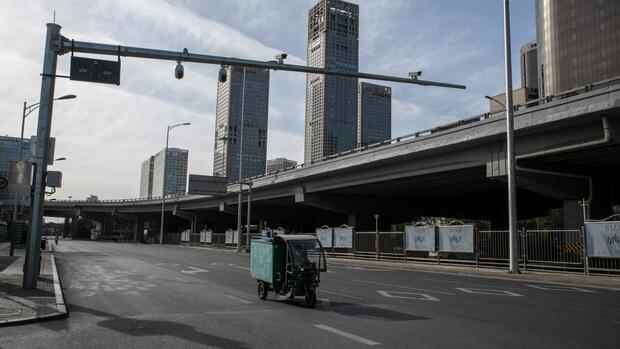So far, the country has not had a sustainable opening strategy in the pandemic.
(Photo: Bloomberg)
Munich The situation in the Chinese economy continued to deteriorate in November. The increasing number of lockdowns as a result of new records in corona infections have dampened the mood in industry and the service sector more than expected. This is shown by the official Purchasing Managers Indices (PMI), which were published on Wednesday. The first economic indicators for November were therefore worse than expected.
The PMI for manufacturing fell to just 48 points from 49.2 points in the previous month, the weakest reading since April. The situation in the service industry is even worse. There, the PMI fell from 48.7 to 46.7 points. Values below 50 for the important economic barometer indicate a downturn.
China’s economy grew 3.9 percent in the third quarter. She had recovered more than expected from the corona lockdowns in spring, including in the financial metropolis of Shanghai. In the second quarter, these had ensured that the world’s second-largest economy de facto stagnated. The growth target of 5.5 percent announced by the Chinese government at the beginning of the year is no longer considered achievable.
The International Monetary Fund (IMF) had already announced on Tuesday that it may have to adjust its forecast for China’s economic growth downwards again. This was explained by IMF boss Kristalina Georgiewa, referring to the corona restrictions and the problems in the real estate sector. The IMF is currently assuming growth of 3.2 percent.
Top jobs of the day
Find the best jobs now and
be notified by email.
Experts fear things could get worse: to some extent, actual growth in November could even be “worse than in April and May, when Shanghai and some other major cities went under complete lockdown,” warns a team of analysts at Japanese investment bank Nomura to China- Chief Economist Lu Ting. The partial lockdowns in an increasing number of cities could cost the country more than full lockdowns in just a few cities.
Protests put government in a bind
The protests against the strict corona measures in many Chinese cities last weekend have put Beijing in a quandary, warn the experts at the analysis company China Beige Book. Either the government can cope with the surge in Covid cases or it will not be able to open the economy. They point out that typically in November there has not yet been a peak in Covid infections, this only comes in winter. “The first quarter of 2023 could therefore get even worse,” fears Managing Director Shehzad Qazi.
The full extent of the impact on the supply chains is not yet foreseeable, since – unlike in spring – attempts are being made in many places to contain corona outbreaks with smaller, more local lockdowns. With moderate success: the number of corona infections had recently risen to a record high. This also makes it clear that the Chinese government has little leeway to relax the strict zero-Covid policy, despite the recent protests. Experts fear that the health system will be overwhelmed and numerous deaths will occur if the number of corona infections increases. Because many Chinese, especially vulnerable groups, are not sufficiently immunized.
China’s industry falls to seven-month low
Since September, the increasing corona numbers in China have led to new mobility restrictions in national long-distance transport, according to an analysis by the French investment bank Natixis. This is considered an early indicator of growing problems in the supply chains. According to the Nomura analysts, the main reason for the growing problems in the industry is the lack of supply with primary products.
Jens Hildebrandt, executive board member of the German Chamber of Commerce (AHK) in China, had already emphasized to the Handelsblatt on Thursday that the interruptions in the supply chains due to the “soft lockdowns” in Beijing and many other cities in China would not yet have a full impact. However, German companies in China are already preparing for “serious effects on production.
Numerous employees are currently unable to get to their jobs due to the tightened measures. “The fact that almost three years after the outbreak of the pandemic there is still no exit strategy for the zero-Covid policy in sight is increasingly met with incomprehension in the German economy,” criticized Hildebrandt. The President of the EU Chamber of Commerce in Beijing, Jörg Wuttke, also spoke of a “catastrophic situation”.
More: With a massive police presence, the Chinese government has so far prevented new protests by larger groups. Politicians in Berlin fear harsh repression against the demonstrators
